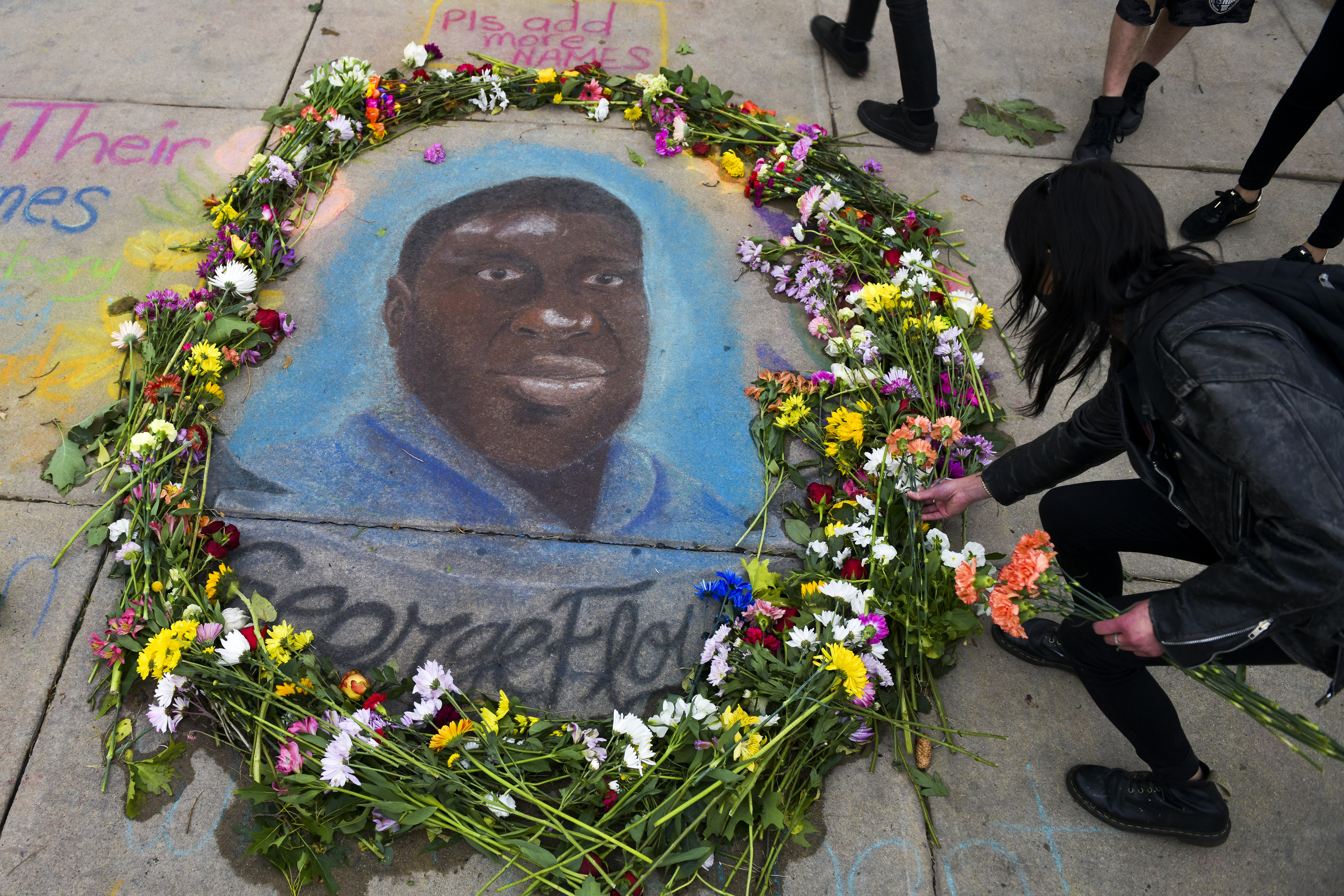 A woman places a flower around a chalk portrait of George Floyd on the steps of the Colorado State Capitol as people protest his death on June 6, 2020 in Denver, Colorado. This is the 12th day of protests since George Floyd died in Minneapolis police custody on May 25. (Photo by Michael Ciaglo/Getty Images)
A woman places a flower around a chalk portrait of George Floyd on the steps of the Colorado State Capitol as people protest his death on June 6, 2020 in Denver, Colorado. This is the 12th day of protests since George Floyd died in Minneapolis police custody on May 25. (Photo by Michael Ciaglo/Getty Images) In the immediate wake of George Floyd’s death on May 25, I was proud of the swift response by Jewish leaders to condemn bigotry and encourage other Jews to fight for justice. Boards of rabbis and individual clergy, Jewish nonprofit organizations, and a network of JCCs — our leadership seemed united in its denunciation of police brutality and Floyd’s murder, and expressed a desire to be a part of change. Enough was enough.
In recent days, it has troubled me to see the increase in Jewish indifference and even opposition to Black Lives Matter. Was it protest fatigue? I struggled to comprehend how any Jew with a sense of history could fall into complacency during a human rights crisis: was internalized racism and investment in the status quo winning out against the Jewish mandate to stand against bigotry and hate? Is violence against Jews the only violence that matters? And lastly, since when can we not distinguish between a just cause, necessary and peaceful protesting and the looting and raiding that takes center-stage in the news?
Steeping myself in reports and opinions, the disconnect seems to boil down to one issue: Israel.
Clearly, a good number of Jews voted for Trump and were therefore willing to ignore his flagrant disregard for the environment, his hateful treatment of immigrants, and his history of financial deceit, sexual harassment, and racism. They did so largely for one reason: because he promised to stand by Israel. I can oppose or dismiss Black Lives Matter, the same people argue, because BDS has expressed its support for the movement, and because many on the “far left” share antagonistic feelings towards Israel.
This unfortunate truth about BDS sucks. And the attempt by those who oppose Israel to co-opt the movement is also why it’s especially important that Jews speak louder than ever — affirming that Black Lives Matter and, when appropriate, standing up for Israel and against anti-Semitism. (If this sounds exhausting, consider the experience of African Americans being asked to spontaneously educate white people on three hundred years of slavery, Jim Crowe, segregation, and the legacy of prejudice against black communities.) Because this is the problem: when Jews exhibit tunnel-vision in their affinity for Israel, disregarding any parties or politicians when Arab sympathy may exist among their followers, they end up siding with the very people who mean them the most harm: white supremacists.
After all, the same people who insist on racism’s nonexistence would also like to for Jews to stop raising their voices on anti-Semitism or teaching the history of the Holocaust. The same people who are willfully or unintentionally uninformed on the experience of people of color in America are also unwilling to acknowledge hate against Jews. These are not our allies.
Quite frankly, the structure and organization of Black Lives Matter is currently lacking, a fact that concerns activists old enough to remember the Civil Rights movement of the 1960s. It remains to be seen whether opposition to Israel – a somewhat bizarre inclusion to the Black Lives Matter 2016 platform that otherwise focuses on purely domestic injustice – will crystallize into pro-Palestinian activism at any point. However, what that also means is that the most important conversations at this moment are on an individual level: Do you believe that black lives matter and that anti-racist work is important? As Jews, the answer to both must be an unequivocal yes.
When Jews stay silent on racism, to any progressive thinker the Jewish world looks guilty of elitism, of suggesting that only our suffering matters. Just as bad, we allow extremist groups to use BLM to further their own agendas, such as by creating an association between American police brutality and the IDF. We must model compassion, fearlessly defend justice, and express a desire to do better in how we educate our children about race. We would do well to correct misjudgments by sharing that there is no conflict between supporting civil rights in America and wanting to preserve and protect our Jewish homeland.
We can support Black Lives Matter, while watching carefully for anti-Israel or even anti-Semitic rhetoric within its leadership. Should this language arise, we must then engage as allies, not as opponents. For in this moment, we as American Jews and, by extension, Israel, can either appear as a part of the problem, or as the champions of freedom and equality we ought to be.























 More news and opinions than at a Shabbat dinner, right in your inbox.
More news and opinions than at a Shabbat dinner, right in your inbox.